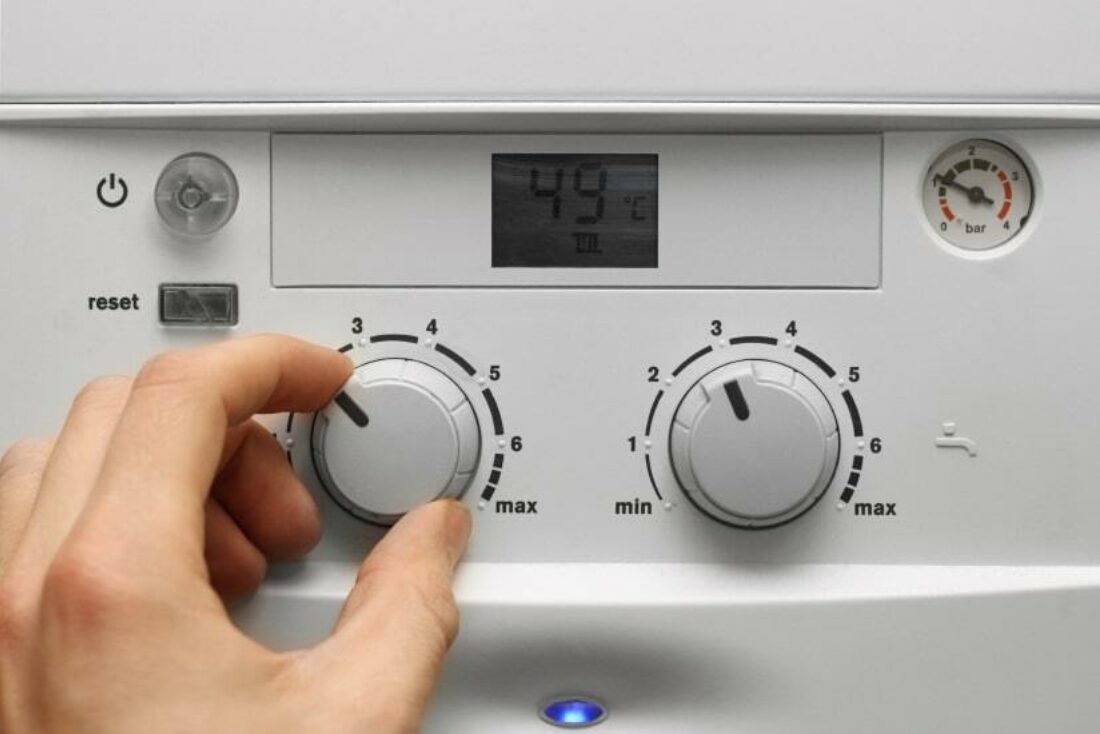Here’s What You Need to Know About the Gas Boiler Ban 2035
- Rishi Sunak extended the deadline in September 2023
- 10 year delay from original 2025 goal
- Alternative heating solutions under the gas boiler ban
The government recently announced the controversial decision - to delay the gas boiler ban in new builds from 2025 to 2035. By 2035, gas boiler installations are expected to be phased out completely. This has many people wondering, “what will replace gas boilers?”
Are you concerned about how you’ll heat your home without a gas boiler? The gas boiler ban doesn't have to be daunting. Read ahead to learn all about gas boilers and find out why the UK Government has made this decision, when the rules come into effect, and what alternatives are available for you to use instead. You can also look at heat pump vs boiler differences.
Ready for a new boiler? Use our quote comparison tool to find out how much you'd pay. It only takes a minute.

What's On This Page?
Click the links below and head straight to a specific section of the article.
What Is the Gas Boiler Ban and Why Is It Happening?
In 2021, The National Housing Federation reported that English homes contribute even more to emissions than cars, with 25 million houses producing 58.5 million tonnes of CO₂ annually. That equals out to the emissions produced by 28 million vehicles! You can see why the government were encouraged to take action. This is one of the reasons why the original deadline of 2025 for the gas boiler ban was set, but this only applied to new build properties.
The new gas boiler ban is part of the government’s attempts to hit the net zero target by 2050. The Net Zero Strategy means that the country needs to cut greenhouse gas emissions down to 45% by 2030, and then to zero by 2050. Since those emissions come from fossil fuels every time we drive our cars and heat our houses, that’s a pretty tall order. However, since Rishi Sunak watered down environmental targets, the 2035 deadline for the gas boiler ban may now pull this reduction into question.
Of course, the current global gas shortage is causing prices to hit all-time highs, and energy companies are going bust left, right, and centre. Climate experts argue that the gas boiler ban can’t come soon enough, but other people are worried about how they’ll heat their homes. Fortunately, there are alternatives available, including the use of energy efficient boilers that don't run on gas.
When Does the Gas Boiler Ban Come into Effect?
The government released the initial gas boiler ban under the Heat and Buildings Strategy in 2021, outlining upcoming changes over the next few years. The strategy was divided into two distinct phases, which were to come into effect in 2025 and 2035. This two-phase rollout was causing some confusion, as people are wondering if the UK gas boiler ban was in effect in 2025 or 2035.
Before the latest government announcement, the gas boiler ban looked like the below:
Phase 1: 2025
The first phase of the gas boiler ban was to take effect in 2025. New builds would no longer be permitted to include gas boilers. The Heat and Buildings Strategy stated that the government would continue to “consult on ending new connections to the gas grid.” There was still time for the plans to change, but builders and heating providers were working towards this date.
Phase 2: 2035
The second gas boiler ban phase was for the all other properties. With new builds no longer including any gas boilers since 2025, the Heat and Buildings Strategy set forward plans to phase out natural gas boilers entirely by 2035. That meant that if you had a gas boiler in your home and it needed to be replaced after 2035, you wouldn't be able to install a new gas boiler. You’ would have to install a low-carbon alternative instead.
Rishi Sunak Announcement to the Gas Boiler Ban
In September 2023, the Prime Minister made a unilateral decision to delay the gas boiler ban. The main argument was for off-grid properties, as they had a separate deadline of 2026 for oil and LPG boilers. This has now also been extended to 2035, and the decision for new builds has been binned. Rishi Sunak argued that no one should be forced to make these changes, which were becoming increasingly unaffordable.
Critics of the decision to delay the gas boiler ban were quick to point out that no one was being forced to make these changes. With new gas boilers being phased out, it was only when a boiler reached the end of its workable life that these costs had to be met. What's more, the government has offered grants in the form of the Boiler Upgrade Scheme, which has historically offered between £5,000 and £6,000 off a low carbon heating alternative. The other half of the gas boiler ban delay announcement was to increase these amounts to £7,500, without any additional funding. This means that fewer people will be able to benefit from the grants overall.
Beyond 2035
It is still unclear what will happen beyond 2035, after the gas boiler ban has been fully implemented. Will the government completely phase out gas boilers? If you still have a gas boiler in good working order, will you be required to switch it out for a low-carbon alternative?
According to the government, you will not be forced to replace a gas boiler in good working order, even after 2035. The gas boiler ban has been designed in such a way that when your gas boiler reaches the end of its working life, only then will you need to switch to an alternative. Read our guide to help research the best boilers in the UK so you're ahead.
"The move to low-carbon heating will be a gradual transition, from niche product to mainstream consumer option.”
The Heat and Buildings Strategy
Grants for Heat Pumps: The Boiler Upgrade Scheme
In addition to the gas boiler ban, the government announced policies to help people make the switch. However, there has been a backlash to the announcement, with some questioning the affordability of more energy-efficient boilers. While heat pumps and other alternatives have high up-front costs, they can save around £1,300 a year for a four-bedroom house.
That’s why the government upgraded the existing grant for low carbon heating. Households can apply for a government grant up to £7,500 to make the switch to lower carbon heating systems as part of the Boiler Upgrade Scheme (BUS). Initially beginning in April 2022, the scheme was due to operate until 2028, but this could always change. A pot of £450 million is available under the scheme, so now is the time to see if you are eligible. Don't wait for the gas boiler ban to come into effect.
The BUS is open to domestic properties across England and Wales. It is also available to small non-domestic households, designed to help transition because of the gas boiler ban. So, it’s smart to check it out now so you don’t accidentally miss out on money to help you get started with a new boiler.
Do you have questions about low carbon heating? Are air source heat pumps worth it?
How Will the Gas Boiler Ban Affect Average People?
Many of us are asking, “do I have to stop using my gas boiler?”
First, remember that the gas boiler ban hasn’t yet come into effect. You now have many years before you need to replace your gas boiler. That said, it’s wise to think about what will replace gas boilers when the deadline comes around.
Thanks to the gas boiler ban, if you plan to move into a new build after 2035, your home may already have low-carbon heating methods installed. New builds may not have gas boilers as an option, but this is now under government review. Similarly, if you’re building your own home, you’ll need to install low-carbon heating options to future-proof it. Be sure to check out the Boiler Upgrade Scheme to see if you can make this cheaper.
Gas Boiler Alternatives
According to the Climate Change Committee’s 2019 report, 14% of UK emissions come from energy use in our homes. It's clear that our heating systems need to cut emissions. Now that we know more about the gas boiler ban, it’s time to start thinking about alternatives.
Over the next few years, low-carbon heating methods are sure to become more popular. With grants available and manufacturers making more of them, heat pumps and other alternatives are certain to become more affordable for the average homeowner.
Here are some of the most common gas boiler alternatives to look into over the next few years: heat pumps, infrared panels, hydrogen boilers, and district heat networks. The Ultimate Guide to Electric Combi Boilers provides electric alternatives.
Heat Pumps
One of the main winners of the gas boiler ban is heat pumps. These are an energy-efficient way to heat your home. They help you generate renewable heat, saving money on your energy bills over time.
There are two main kinds of heat pumps: air source heat pumps and ground source heat pumps, neither of which rely on fossil fuels. Air source heat pumps extract air from outside, while ground source heat pumps absorb heat from the ground outside. With both types of heat pump, you need to ensure your home is well insulated so that the heat doesn’t escape.
Heat pumps can be quite costly to install, so the government is offering grants for homeowners. That said, installation can cost between £5,000 and £30,000, depending on the size of your home.
The good news? Households typically save nearly £3,000 over a heat pump’s lifespan and prevent 20 tonnes of CO₂ from entering the atmosphere.
Infrared Panels
Infrared heating panels are a new technology in the UK - sometimes you’ll hear them called radiant heating panels. They use the radiant heat spectrum to bring heat into specific areas of your home. They don’t warm the air in the room as a whole. Instead, they heat the panels directly, which then radiates throughout the room.
Some people use infrared heating panels for their entire homes, while they can also be used to complement central heating. Since they heat objects and not the air, they work really well in ‘hard to heat’ areas or parts of the home with poor insulation.
To fully replace your boiler, you’ll also need an air-sourced hot water cylinder. You do need one panel for each room, so costs vary between £2,000 and £3,000 for installation in a three-bedroom home. They should lower your heating costs by 30 – 50%, but that does depend on your insulation levels.
Hydrogen Boilers
Hydrogen boilers are being proposed as an alternative to gas boilers – they operate very similarly, but they use hydrogen, which is a cleaner fuel. A 20% hydrogen blend is already being introduced into the UK mains supply to prepare for future demand.
Hydrogen boilers work the same as gas boilers, so there will be no learning curve. Your boiler will burn the hydrogen, and then the resulting hot flue gases will be used to heat your radiators and water or saved for later use.
This technology is currently in the development stage, so we’re not sure about the cost. However, experts predict they will cost around the same as gas boilers – so this truly could be a great alternative when the gas boiler ban comes into effect.
District Heat Networks
District heat networks are currently a rare solution, but they could become more common after gas boilers are banned in the coming years. They consist of an underground network of insulated pipes that deliver heat from one source to another (usually different buildings).
A good example is the Bunhill 2 District Heating Network in North London. It uses unwanted heat from the Underground to provide cheap heat to neighbouring homes. Could more district heat networks be on the way across the country?
Will the Gas Boiler Ban Help the UK?
With the gas boiler ban coming into effect and phasing out traditional gas boilers over the next decade, this will help the environment, but not as much as the original scheme was designed to. Gas isn’t as harsh on the environment as coal and oil, but the data certainly shows that it’s fanning the flames of climate change.
This move also shows that the government is taking its net zero 2050 target seriously. That means we’ll have cleaner water, cleaner air, and a healthier country overall.
For a quote on non-gas boilers, fill in our form.
Related articles
View all Boiler articles
Top Tips When Buying a New Combi Boiler

Save on Heating by Keeping Your Boiler at 60°C

Smart Boiler Installation: All You Need to Know

Smart Thermostat Guide: All You Need to Know

Boiler Systems: All You Need to Know About Domestic Boilers

What Size Boiler Do I Need for My Home?

The Complete Guide to Worcester Bosch Boilers







